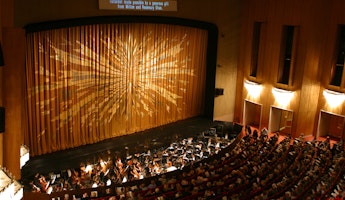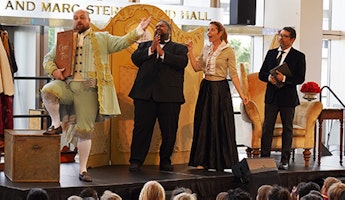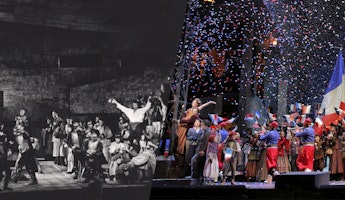From: Berkeley, California. LA Opera: The Five Moons of Lorca (2020, Digital Short); The Last Dream of Frida and Diego (2023).
Currently serving as Composer-in-Residence with the storied Philadelphia Orchestra and included in
The Washington Post's list of the most significant women composers in history (August, 2017), composer/pianist Gabriela Lena Frank has always had identity at the center of her music. Born in 1972 to a mother of mixed Peruvian/Chinese ancestry and a father of Lithuanian/Jewish descent, Gabriela explores her multicultural heritage through her compositions. Inspired by the works of Bela Bartók and Alberto Ginastera, Gabriela has traveled extensively throughout South America in creative exploration. Her music often reflects not only her own personal experience as a multi-racial Latina, but also refract her studies of Latin American cultures, incorporating poetry, mythology, and native musical styles into a western classical framework that is uniquely her own.
Moreover, she writes, "There's usually a story line behind my music; a scenario or character." While the enjoyment of her works can be obtained solely from her music, the composer's program notes enhance the listener's experience, for they describe how a piano part mimics a marimba or pan-pipes, or how a movement is based on a particular type of folk song, where the singer is mockingly crying. Even a brief glance at her titles evokes specific imagery:
Leyendas (Legends): An Andean Walkabout; La Llorona (The Crying Woman): Tone Poem for Viola and Orchestra; and
Concertino Cusqueño (Concertino in the Cusco style). Gabriela's compositions also reflect her virtuosity as a pianist — when not composing, she is a sought-after performer, specializing in contemporary repertoire.
In 2020, Gabriela was a recipient of the prestigious 25th anniversary Heinz Award in the Arts and Humanity category with an unrestricted cash prize of $250,000, a meaningful portion of which was donated by Gabriela to the
Gabriela Lena Frank Creative Academy of Music. The award recognized Gabriela for breaking gender, disability, and cultural barriers in the classical music industry, and for her work as an activist on behalf of emerging composers of all demographics and aesthetics.
Winner of a Latin Grammy and nominated for Grammys as both composer and pianist, Gabriela also holds a Guggenheim Fellowship and a USA Artist Fellowship given each year to 50 of the country’s finest artists. Her work has been described as “crafted with unself-conscious mastery” (
Washington Post), “brilliantly effective” (
New York Times), “a knockout” (
Chicago Tribune), “glorious” (
Los Angeles Times) and “a magical world premiere” (
Wall Street Journal). Gabriela is regularly commissioned by luminaries such as cellist Yo Yo Ma, the King’s Singers, the Cuarteto Latinoamericano with guitarist Manuel Barrueco, and conductors Marin Alsop and Yannick Nézet-Séguin. She has also received orchestral commissions and performances from leading American orchestras including the Chicago Symphony, the Boston Symphony, the Atlanta Symphony, the Cleveland Orchestra, the Philadelphia Orchestra and the San Francisco Symphony. Before her current residency with the Philadelphia Orchestra for which she will compose the 45-minute
Picaflor (Hummingbird), in 2017 she completed her four-year tenure as composer-in-residence with the Detroit Symphony under conductor Leonard Slatkin, composing
Walkabout: Concerto for Orchestra, as well as a second residency with the Houston Symphony under Andrés Orozco-Estrada for whom she composed
The Conquest Requiem, a large-scale choral/orchestral work in Spanish, Latin, and Nahuatl, the language of the Aztecs.
Gabriela’s most recent premieres have been
Pachamama Meets an Ode for chorus and orchestra commissioned by the Philadelphia Orchestra and unveiled at Carnegie Hall under the baton of Yannick Nézet-Seguín;
Haillí-Serenata for Chicago Symphony under the baton of Andrés Orozco-Estrada;
Las Cinco Lunas de Lorca (“The five moons of Lorca”) commissioned by LA Opera;
Apu: Tone Poem for Orchestra commissioned by Carnegie Hall and premiered by the National Youth Orchestra of the United States under the baton of conductor Marin Alsop; and
Suite Mestiza, a large-scale work for solo violin premiered by Movses Pogossian.
In the season of 2022/23, co-commissioners San Diego Opera and San Francisco Opera premiered Gabriela’s first opera,
El último sueño de Frida y Diego (“The last dream of Frida and Diego”), utilizing words by her frequent collaborator Pulitzer Prize winning playwright Nilo Cruz.
El último sueño de Frida y Diego, which was produced at LA Opera in 2023 and will be staged in a new production by the Metropolitan Opera in the 2025/26 season, was described by
The New Yorker as revealing “a significant music-theatre talent. Frank has mastered the intricacies of operatic construction on her first attempt, producing a confident, richly imagined score that is free of lapses and longueurs. Let’s hope that more opera commissions come her way.” Other upcoming projects include recording
The Conquest Requiem with the Nashville Symphony under the baton of Giancarlo Guerrero for the Naxos Records label followed by a staged performance at the Metropolitan Opera in the fall of 2024; a new work with the St. Paul Chamber Orchestra for voice and orchestra with texts by the award-winning scientist/birder/poet J. Drew Lanham; a string quartet for the Fry Street Quartet; and others.
Gabriela is the subject of several scholarly books including the W.W. Norton anthology
The Musics of Latin America; Women of Influence in Contemporary Music: Nine American Composers (Scarecrow Press); and
In Her Own Words (University of Illinois Press). She is also the subject of several PBS documentaries including
Compadre Huashayo regarding her work in Ecuador composing for the Orquestra de Instrumentos Andinos comprised of native highland instruments; and
Música Mestiza, regarding a workshop she led at the University of Michigan composing for a virtuoso septet of a classical string quartet plus a trio of Andean panpipe players.
Músic Mestiza, created by filmmaker Aric Hartvig, received an Emmy nomination for best Documentary Feature in 2015.
Civic outreach is an essential part of Gabriela’s work. She has volunteered extensively in hospitals and prisons, with her current focus on enhancing the music program within the Anderson Valley Unified School District, a rural district of modest means with a large Latino population in Boonville, California.
Gabriela is also a climate activist, co-authoring articles on climate action within the music industry for
Chamber Music America Magazine and creating a Climate Commitment for GLFCAM. She has also written about her hearing loss as a guest columnist with
The New York Times, “I think Beethoven encoded his deafness in his music.”
In 2017, Gabriela founded the award-winning Gabriela Lena Frank Creative Academy of Music whose history and mission can be found
here.
Gabriela attended Rice University in Houston, Texas, where she earned a B.A. (1994) and M.A. (1996). She studied composition with Sam Jones, and piano with Jeanne Kierman Fischer. At the University of Michigan, where she received a D.M.A. in composition in 2001, Gabriela studied with William Bolcom and Leslie Bassett and piano with Logan Skelton. She currently resides in Boonville, a small rural town in the Anderson Valley, with her husband Jeremy on their mountain farm, has a second home in her native Berkeley in the San Francisco Bay Area, and has traveled extensively in Andean South America.
Gabriela is a member of Wise Music/G. Schirmer’s prestigious roster of artists, exclusively managed and published.








/03-cosi/_dsc0996_pr.jpg?format=auto&fit=crop&w=345&h=200&auto=format)














/on-now-ds-mod.jpg?format=auto&fit=crop&h=1429&auto=format)










/brownsounds-homepage.jpg?format=auto&fit=crop&w=702&h=462&auto=format)
/brownsounds-homepage.jpg?format=auto&fit=crop&w=1450&h=455h&auto=format)
/whtt-130-4k-high-bitrate-export-00_06_56_17-still001.jpg?format=auto&fit=crop&w=702&h=462&auto=format)
/whtt-130-4k-high-bitrate-export-00_06_56_17-still001.jpg?format=auto&fit=crop&w=1450&h=455h&auto=format)